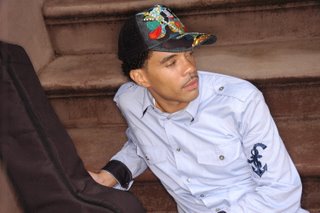
by Jason King
for www.soulmusic.com
Hard to believe that 1990s r&b prodigy Tevin Campbell turned thirty earlier this month (November 12th). Harder still to believe it's been nearly seventeen years since he made his debut on the charts.
In the late 1980s, the Waxahachie, Texas wunderkind was discovered by funk flutist Bobbi Humphrey, recruited by Warner exec Benny Medina, and marketed as a new jack Jackson 5-era Michael. Ubiquitous Quincy Jones featured the eleven-year-old on "Tomorrow," the optimistic lead single from the Grammy-winning Back on the Block ensemble album.
Tevin's high-reaching, eager tenor - heard in all its glory on the stratospheric power ballad "Tell Me What You Want Me To Do" from 1991 solo debut T.E.V.I.N. - distinguished him instantly from more mundane teen pop idols of the time (The New Kids on the Block and Tommy Page come to mind). His nasal and slightly southern sound - delivered with disciplined attentiveness to melody line and minimal riffing - perfectly suited him to technically challenging, lushly synthesized slow jams.
Tevin was, in retrospect, the ultimate male interpreter of Babyface songs (next to Kevon Edmonds): soaring tuners like "Can We Talk" and "I'm Ready" (from his 1993 sophomore set) of the same name remain adult contemporary quiet storm classics despite deliberately adolescent lyrics and bubblegum sentiment. No surprise there: like progenitor Michael, Tevin sang with a mature intensity and professionalism way beyond his age, probably cultivated during his early days as an amateur night competitor. He was less successful with uptempos: except for Prince-produced 1990 Graffiti Bridge hit "Round and Round" (Tevin also co-starred in the film), the singer seemed straight-jacketed by 1990s hip-house rhythms ("Uncle Sam"). Seduction jams ("Shhh") also seemed to conflict with his immaculate, goody-two-shoes image.
Clearly inspired by female r&b divas, Tevin quotes Aretha Franklin vocal licks at the end of his remake of "Keep on Pushing" from 1994's A Tribute to Curtis Mayfield. (Actually, Aretha's 1972 Amazing Grace was the first album his mother, manager Rhonda Byrd, gave him.) His 1996 third album, the Rahsaan Patterson-Jamey Jaz composed Back to the World, was a commercial disappointment that now deserves critical rethinking, particularly given the uncanny similarities between Tevin and Rahsaan's otherworldly vocals. Raised in the church, Campbell never recorded a gospel album, though his near-classical performances on songs like "I Know My Redeemer Liveth" from 1992's Handel's Messiah: a Soulful Celebration, and "O Holy Night" from A Very Special Christmas 2, remain two of his best musical moments.
The poetic lyric to "Infant Child," the haunting gospel outro on 1993's I'm Ready- "No matter what I become, I will always remain my Lord's supreme infant child" - suggests, in hindsight, future demons. On the heels of an inconsistent forth album, 1999's Another Way, Tevin was publicly arrested in Los Angeles for soliciting sex from an undercover male police offer. Tevin's career unraveled soon after, punctuated by a comment by Chris Rock on Wendy Williams' Hot 97 radio show in which he remarked that rising superstar Usher was great because he was like "the straight Tevin Campbell." Tevin hasn't released a studio project since.
Chris Rock's remark - homophobic in that it capitulates to a kneejerk machismo that tragically limits the stylistic options for black men - is a sad reminder that torches in soul music haven't been properly passed on. While Usher and progeny like Omarion and Chris Brown draw on kinetic dancing skills to liken themselves to Michael Jackson, they're not hair-raising singers in Michael's mold, despite what the publicity machines may tell you. (For his debut album, Usher was originally positioned as a 'bad boy' teen alternative to Tevin.)
Tevin, on the other hand, seemed born for little else than singing. (In fact, he was never much of a dancer, resulting in stilted choreography on televised appearances in the 1990s like Arsenio.) For my money, Tevin was the most technically accomplished young male r&b singer to debut in the 1990s, but I've never heard any recording artist since mention him as an influence. In that vaccuum, the choices for today's teen male mainstream r&b singers have become increasingly limited - most are hip-hop identified pop lockers who happen to croon, and they don't leave much room for the divos.
Tevin is currently appearing in Hairspray on Broadway, and on his Wikipedia profile, there's mention of an upcoming project featuring A-list producers like Scott Storch although there's no confirmation of it anywhere else on the web at this time.
This article is also published at www.soulmusic.com



